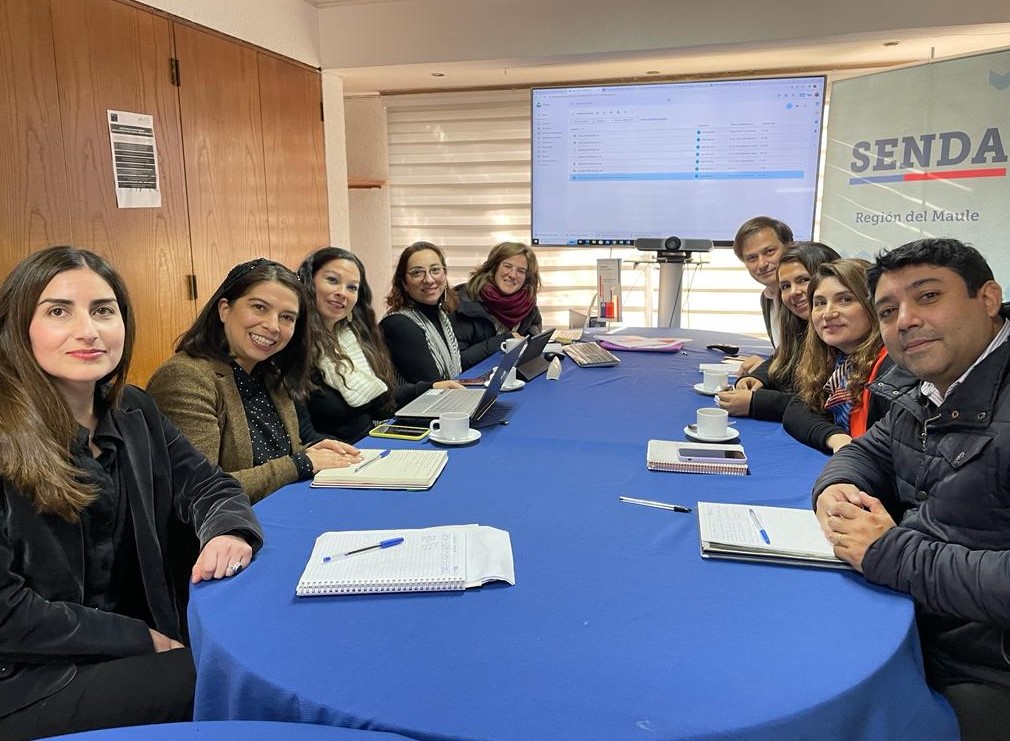The Cooperation Program between Latin America, the Caribbean and the European Union on Drug Policy (COPOLAD III), the Chilean National Service for the Prevention and Rehabilitation of Drug and Alcohol Use (SENDA) and Agirre Lehendakaria Center, a social innovation laboratory linked to the University of the Basque Country, have combined their knowledge and experience to launch, in the Chilean region of Maule, the first Social Innovation Laboratory dedicated to address, from a systemic perspective, drug use among children and adolescents, who are under the guardianship and protection of the State.
As part of this initiative, two collective interpretation sessions were held from July 27 to 29 in Santiago and Talca (Maule Region), focused on jointly contrasting the information generated by the local teams in the first phase of the Laboratory’s listening and mapping process. The participants included authorities and institutions such as the Ministry of Health or the Specialized Protection Service for Children and Adolescents, international organizations such as UNICEF and relevant community agents, among others, personnel from family residences, consumption prevention programs, health and education professionals, the Paréntesis Foundation, the La Escalera program or the Mi Abo-gado program.
Participants included authorities and institutions such as the Ministry of Health or the Specialized Protection Service for Children and Adolescents, international organizations such as UNICEF and relevant community agents, among others, staff from family residences, drug use prevention programs, health and education professionals, the Paréntesis Foundation, the La Escalera program or the Mi Abogado program.
During the opening of the sessions, the Director of SENDA, Natalia Riffo, and the Undersecretary for Children, Verónica Silva, insisted on the importance of coordinating the work between the institutions involved. They also pointed out the relevance of designing new strategies or governance systems that can be replicated in the rest of the country and are able to adapt to local realities: “The average does not work, we must be able to provide differential responses”.
More comprenhensive perspective
Some participants highlighted how it is essential to incorporate mechanisms to understand the role that consumption plays in the population from a broader and more comprehensive perspective.In connection with this perception, several participants consider it interesting to continue experimenting with the harm reduction approach or the diversification of the thresholds of demand in the centers.
ALC joins the COPOLAD initiative towards the creation of social innovation labs surrounding drug policies
The process has already begun in Chile and will continue to be developed in Colombia and the potentially the Caribbean.https://t.co/XSIu0ZeyDk— Agirre Center (@agirrecenter) July 10, 2023
Two contradictory narratives were also identified regarding who is responsible for consumption: is it a phenomenon that should be addressed at the individual or institutional level or, on the contrary, does it transcend the community in a broad sense. The attendees agreed on activating new listening channels to incorporate the voice of the NNAS and the community systematically in the design of interventions: “We must prevent the community from becoming an enemy, so we must work with them to eliminate stigmatization” was on of the ideas repeated.
The collective interpretation sessions provide a space for sharing the different ways of perceiving the same problem and, repeated over time, can help to generate shared visions and a more in-depth analysis of the critical nodes on which to focus public policy strategies in terms of social innovation. This analysis will serve as the basis for the process of co-designing solutions that will take place in the coming months. The objective is to ensure that the strategies developed by the teams incorporate the capacity to respond to the different narratives that operate in the territory and allow them to constantly adapt to changes, thus generating flexible governance systems to address complex challenges such as drug use among minors under the care of the State.






